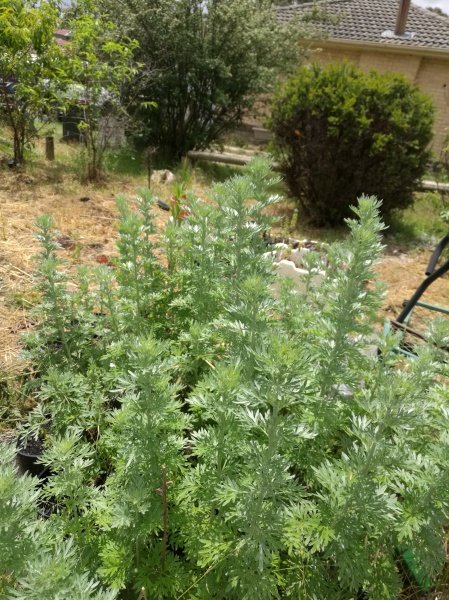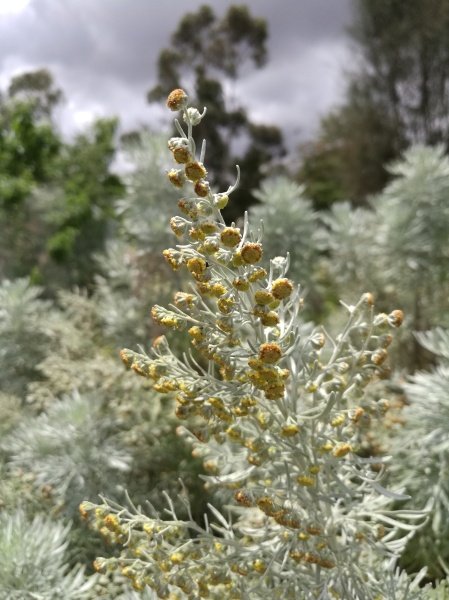Garden Herbs - Wormwood
Hi Herbal Hiveans. Here's the next in my new series of posts covering how to use the herbs in our garden. You can find the earlier ones by wandering back through my blog. Once I've quite a few, I'll make an index page for them for your ease of use. This installment is about Wormwood.

Common names: Wormwood, Absinthe Wormwood, Grand Wormwood
Taxonomic name: Artemisia absinthium
Family: Asteraceae
Uses: Making alcoholic spirits, parasites, depression, stiffness, tiredness, poor digestion
Area of origin: Eurasia
Warnings: Toxic in very large doses
When were talking about Wormwood here, we’re talking about Artemisia absinthium. There are many other Artemisia species and they all share similarities in use, as well as their own special properties. That means that you can substitute species easily in your remedies.
Wormwood is famous for its use in two main areas; as a digestive stimulant and for getting rid of parasites.
The second property is the simplest. Wormwood contains substances that rid the body of worms, from pinworms and roundworms to scabies and athletes foot. I know Athlete's Foot isn’t caused by worms but it can be improved by Wormwood and is a skin condition.
Drinking an infusion or decoction, as well as external application where necessary can chase the little bugs out of our bodies.
To extend this thinking further, strewing Wormwood around can chase away mice and fleas. For a long time, I’ve grown it near my chooks who benefit from both of its main properties both when it is growing and they nibble on it and when I strew it in the chook house and nesting boxes.
The second, and far more medically interesting property is its use as a bitter. Bitters are a class of herbal compounds that have deep and meaningful effects throughout our bodies, not just on the digestion. Bitter receptors have been found throughout the body, even in the lungs. It’s a good example of where we don’t quite know how something works, as the bitter molecules are broken down during digestion, so how do they get around the rest of our bodies?
On their simplest level, the bitters in Wormwood stimulate saliva, stomach acid and bile, all substances of vital importance to our health. Without these, there simply is no digestion.

As you can guess, Wormwood is good for stomach and liver problems that come from under-activity of either of those organs or the gall bladder. Heartburn, indigestion, biliousness, nausea, even jaundice.
At a deeper level, Wormwood helps to restore and stimulate nervous activity and a tired mind. It does this through its bitter principles too (aren’t they great?).
My take on it all is that Wormwood stokes the ‘digestive fire’ it stimulates activity of the digestive tract at a nervous level, allowing new found energy to find its path through the body where it finds it’s expression as increased nervous activity, vitality and energy.
With this viewpoint in mind, we can understand some of the psychological uses of Wormwood.
It has been used for depressive states, particularly chronic depression. I’ve heard of it being used to relieve the negative states of folks who are holding on to their depression, who find it a safe and secure state to be in, but need to realize that it’s not a good place to be.
Along with depression, Wormwood can be useful in cases of cold and stiffness and atrophy caused by both of those states (remember that digestive fire?). Wormwood has even been used in England as part of a love charm (insert your own jokes here…).
Another common Wormwood, more common in gardens in this area is Tree Wormwood (Artemisia arborescens). For our purposes, we can treat it the same way as Common Wormwood.
Making a tea from this herb
To make tea, simply place a teaspoonful or two of dried or fresh herb into a cup of hot water. Cover the cup while the brew steeps so that you don't lose any of those precious oils.







Is there a way to tell the difference between common and tree wormwood? Those flowers in your second photo look like the ones on mine.
I rather like the smell of wormwood, it makes me think of a medicinally clean environment, rather like it's cleansing the environment it's in. I haven't used it myself, but I put it in for the rabbits on occasion, so the room smells of it when I do. I gather it's a very strong butter taste, which is why I've not gotten the confidence up to try it in a tea yet.
It is confusing. I use leaf tip shape as a guide. Tree Wormwood has rounded ends while Mugwort has pointed tips. A s a tea, it's yuck! I make a wormwood tea for the chooks from time to time to help clean them out. They don't seem to mind it at all.
The pic you mention is Tree Wormwood. Sometimes Markdown lets me put captions in, sometimes it doesn't. maybe it needs a purge with digital Wormwood!
I used it for the anti-parasite properties for the chickens. I've also used it in my cedar closet to repel pests.
It's a great idea to grow it close to where it's to be used.
!hivebits
Success! You mined .9 HBIT & the user you replied to received .1 HBIT on your behalf. mine | wallet | market | tools | discord | community | <><
What's HBIT?